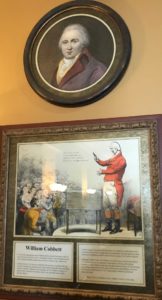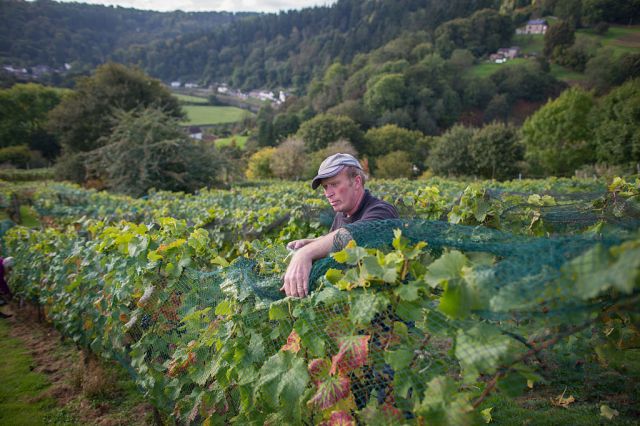Harvesting grapes in Monmouthshire. Credit: Matt Cardy/Getty Images

If you leave England via the Severn bridge and drive through Wales’ Wye Valley, on a road parallel with the river, you will come to a settlement central to the history of these isles: Monmouth. I should warn you: it is a tad twee. It has an M&S Simply Food and a Waitrose. It’s that sort of small town. I should, also, declare my interest: one of my ancestors, a hardcase Welsh Borders esquire called John ap Harri, fought at Agincourt alongside Henry V, the warrior king who was born in Monmouth castle. So I confess to experiencing a small frisson of pride every time I go down Monmouth’s charming main (and almost only) street.
If, like the ap Harris and their descendants, you appreciate a ruck then — despite its genteel, beside-the-languid-Wye ambience — Monmouth is your kind of town. As well as the castle ruins, there is the Nelson Museum — the victor of the Nile and Trafalgar performed quite a lot of trysting with Emma Hamilton hereabouts. But my own personal place of “have-a-go” pilgrimage is the Wetherspoons situated (of course) on Agincourt Square.
I am an expert on that watering hole, The King’s Head, a rambling coaching inn dating from the 17th century, since I spent multitudinous hours under its stuccoed ceilings during the interval between collecting one child from Extra-Curricular Activity A at 5pm and waiting for the other to finish Extra-Curricular Activity B at 9pm. (We sometimes even spent the night in the pub, rather than do the 50-mile round trip home and back again to school in the morning. Country life, eh?) There are advantages to Wetherspoons, I find: their reputation as déclassé keeps out sanctimonious snobs. You are pretty safe from Emily Thornberry in a Wetherspoons.
I have digressed. The truest reason I love The King’s Head is that William Cobbett once gave a lecture there: an event commemorated by a nice print on the wall of the man — in red jacket, white britches and black boots, all properly Georgian — and a bit of accompanying biographical text.

Cobbett was a scrapper on the same majestic scale as our Henry V and our Horatio, except he dished it out to Vested Interest rather than Jean-Pierre Foreigner. He is the faded star of the British Awkward Squad (Capt. Jon. Swift; Vice Capt. Geo. Orwell) and he needs a boost. He needs a blue plaque on every place he ever visited. In his long life — he was born in 1763 and died in 1835 — Cobbett was a farmer, Tory, soldier, Radical, MP, agony uncle (his books include Advice to Young Men), and the founder of Hansard.
His obituary in The Times, after categorising him as a “self-taught peasant”, declared Cobbett “by far the most voluminous writer that has ever lived for centuries”. The funniest, too: when some town council somewhere banned his anti-Malthusian play Surplus Population, he riposted with a drama entitled Bastards in High Places.
Above all, though, Cobbett was the champion of the rural poor, the village labourer and the small farmer. He was their one true tribune. He spoke at The King’s Head in 1820 because country folk were suffering a triple wham from agricultural depression, enclosure and the rise of agri-business. Or, to precis, “Hodge” (his name for the generic farm worker) was low-waged or unwaged and deprived of the bits of land he had once enjoyed under commoner’s rights.
Cobbett railed against “The Thing” (the capitalist, manufactory system) and the centrifugal, corrupting force of smoky London (“The Wen”, in Cobbettian). But he was no bloviator: he was a farm boy, and hence entirely empirical and properly pragmatic. He spent a decade travelling around the English sticks to discover the true state of affairs. His descriptions of his horseback journeys were published in 1830 as Rural Rides, the first sociological study of the English countryside.
No dry-as-dust tome by the way, the Rides: it brims with pinned-to-the-specimen-board descriptions of people and places, nature, wit. Cobbett knew beauty and, the proper Englishman that he was, he loved horses:
The finest sight in England is a stage coach ready to start. A great sheep or cattle fair is a beautiful sight; but in the stage coach you see more of what man is capable of performing. The vehicle itself, the harness, all so complete and so neatly arranged; so strong and clean and good. The beautiful horses, impatient to be off. The inside full and the outside covered, in every part with men, women, children, boxes, bags, bundles. The coachman taking his reins in hand and his whip in the other, gives a signal with his foot, and away go, at the rate of seven miles an hour.
One of these coaches coming in, after a long journey is a sight not less interesting. The horses are now all sweat and foam, the reek from their bodies ascending like a cloud. The whole equipage is covered perhaps with dust and dirt. But still, on it comes as steady as the hands on a clock.
Speaking at The King’s Head coaching inn in Monmouth must have been the dream gig for Cobbett the horseman.
When you go to that Wetherspoons yourself, take a copy of Rural Rides with you, sit under Cobbett’s portrait, and ask yourself the following question. Given all the Westminster-overlooked problems of British country people in 2020 — from the absence of public transport to abundance of second-homers — who speaks for us now? Where is our champion, our Cobbett? The one of us who can speak for us? Where?
Cobbett’s solution to the woes of the Regency rural poor was a return to a barter-based Medieval economy under gent paternalists with a sense of noblesse oblige, plus Parliamentary voting reform, creating a Britain where there would be “room for us all, and plenty for us to eat and to drink”. In the bon mot of his biographer Richard Ingrams, Cobbett sought a “Brave Old World”.
Even in the 19thcentury, the call to go “back to the land” — vacating the towns and dismantling the factory system — was unrealisable nostalgia. But that is not to say that Cobbett’s proposals were meritless. One in particular needs dusting down today: self-sufficiency, as promoted in his manual and manifesto, Cottage Economy.
Of course — and I hear your sniggers — self-sufficiency has become a Tom-and-Barbara Good Life laugh, if a slightly strangled one now that, due to Covid “collapsology”, your neighbours are fleeing the Wen for a house with a large garden in Norfolk. If you truly believe self-sufficiency too quaint, ponder this: in France some 20% of the fresh produce consumed is still raised in the kitchen garden, the potager. Then ponder this also: during Covid, France’s newspapers declared “Potagers et jardins, les stars du confinement”. Well, obviously. Soul, stomach, sense of self-reliance, re-connection to healing nature all satisfied by a quarter of an acre. Every one of psychologist Abraham Maslow’s “Hierarchy of Needs” ticked. Voila!
Actually, self-sufficiency, autarchy, backyard farming — call it what you like — is a venerable British tradition. Once upon a time governments even sponsored self-sufficiency via Smallholdings Acts authorising acquisition of land for those wanting to grow their own. Between 1908 and 1914 alone, 205,103 acres were purchased in England and Wales for smallholders and allotmenteers. In return for service in the Great War, 24,000 soldiers were settled on plots in our green and pleasant land. The allotment movement was boosted by Round 2 with militaristic Germany, 1939-45, and the “Dig for Victory” campaign. By 1943 there were 1,400,000 allotments in the UK, producing a gob-smacking 1.3 million tonnes of food.
Then came the outbreak of peace, the population doubling to 60 million, and an expansion of housing which caused hard-pressed local authorities to sell land to developers. Currently, there are a niggardly 250,000 allotments in the UK, and the waiting lists are as long as rake handles. But now that BoJo has decided that money does, after all, grow on trees, why not spend a casual couple of billion purchasing land around Britain to be divided up into plots for village people and townspeople alike? (I propose this be called “The Cobbett Scheme”.)
So, when you are in Monmouth, do visit The King’s Head. Cobbett, the man who dined alike with Pitt and farmworker, who hated cruelty to animals, and appreciated a good pint, would have been entirely at home in a Wetherspoons —with their CAMRA ale, RSPCA Freedom Food eggs, Marine Stewardship Council fish (I have eaten in Michelin starred restaurants with less ethical food and drinks policies) and its merciful absence of stuffed shirts.And, alongside Rural Rides, have Cottage Economy with you, and ask yourself this ultimate question: do we not need more self-sufficiency in this country?
I say we do. As the Sex Pistols should have sung: “Autarchy for the UK!”










Join the discussion
Join like minded readers that support our journalism by becoming a paid subscriber
To join the discussion in the comments, become a paid subscriber.
Join like minded readers that support our journalism, read unlimited articles and enjoy other subscriber-only benefits.
Subscribe